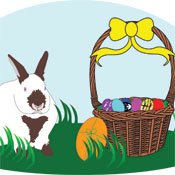This year, skip the chocolate bunnies with the disturbing neon eyes and go for a more practical and eco-friendly Easter basket.
Baskets
If this is your first time making Easter baskets for your family, you will need to find some baskets first. Regular round baskets with handles in non-Easter colors are usually sturdier than their cheaply made counterparts. It is also easier to find larger baskets in the non-Easter aisle. Look for baskets that will last for many years to come at your favorite thrift store or home store, and get creative with Easter ribbons and Easter grass for color. Many stores carry shredded recycled paper in seasonal colors that would be perfect to reuse each year to line your baskets.
Eggs and Treats
In addition to hunting for durable baskets and reusing Easter grass, look for sturdy plastic Easter eggs that won't end up in the trash. Another good option is to paint paper maché eggs from your nearest craft store. Such colorful, refillable eggs are perfect for holding small amounts of bulk candies such as jelly beans and chocolate eggs. Stay away from individually wrapped candies, which are more wasteful than larger bags of unwrapped treats. Ask your favorite local store to carry fair trade and organic options. You could also think about creative alternatives such as making your own Easter bunny trail mix.
Books and Gifts
When I was growing up, my mom always included a gift or two along with our edible Easter treats. Books are a great start. For kids, it is hard to go wrong with Dr. Seuss's conservation classic, "The Lorax." Adult readers might appreciate "The Home Energy Diet: How to Save Money by Making Your House Energy Smart" by Paul Scheckel or "The Green Bible." Or, you might find another gem at a used bookstore. A can't miss eco-Easter gift for both the readers and non-readers on your list is the BBC's "Planet Earth" DVD series.
Once you've got the big stuff and the sweet stuff covered, it is time to fill in the gaps in the middle of the basket. Cloth grocery totes, stainless steel water bottles and eco-friendly soaps are good ideas. Organic cotton or wool socks are an excellent practical choice for any age. Sustainably forested pencils or non-toxic art supplies may be the perfect gift to round out your child's school supplies for the remainder of the semester. Small wooden or stuffed toys are good choices for younger children. If you are feeling creative, you could even think about sewing hand puppets from fabric scraps or sanding and painting a set of blocks from small wood scraps.
Eggs and Rabbit Food
What self-respecting Easter basket doesn't have a couple of fresh, organic carrots with leafy green tops and a few hard-boiled free-range eggs poking out? Just be sure to pop those eggs back into the refrigerator as soon as possible and make your egg salad within a day or two of boiling the eggs. Contrary to seemingly sound logic, boiling an egg makes it spoil more quickly.
With just a little bit of time and creativity, this year's practical eco-baskets will be a big hit. Once you have invested in the right holiday supplies, filling your baskets will be even easier and cheaper in future years. Of course, if you don't have the funds to make baskets this year, wait until the after Easter sales and pick out some supplies for next year's bounty.



Comments
Use the comment form below to begin a discussion about this content.
comments powered by Disqus